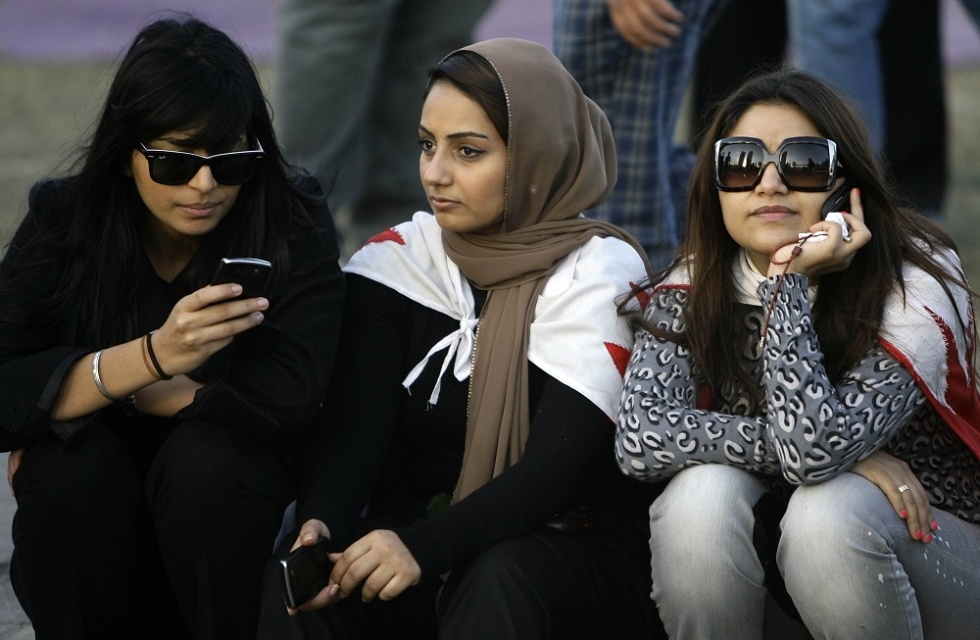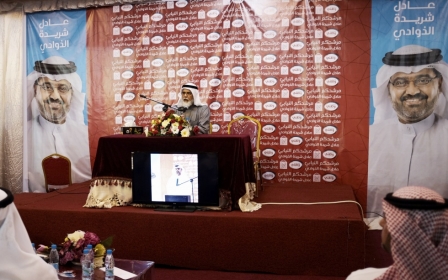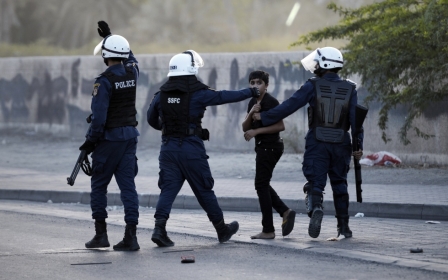ANALYSIS: Bahrain's election - husbands, iPhones and jobs

Bahrain’s fourth parliamentary election since 2002 has been off to an inauspicious start. A coalition of opposition parties, including al-Wefaq, the country’s largest opposition society, have announced that they will boycott the elections, and are now propagating the hashtag #No_Vote_BH. The government on the other hand, is pushing people to participate in Saturday’s elections, claiming that “voting is a necessity as well as a patriotic duty.”
While it seems paradoxical that a regime accused of human rights abuses should be encouraging people to engage in democratic elections, activists such as Maryam Al Khawaja tweeted: “in the current environment, it is not possible to have free and fair elections even if the logistical part is done right #Bahrain #Fail”.
Current Election Campaigning
Indeed, the options available to citizens seems less than enticing. Ali Salman, the General Secretary of al-Wefaq, recently claimed that no one took the elections seriously, and that they are merely the ‘topic of jokes’. It is not that difficult to see what he meant.
For example, Ahmed Arrad one of the candidates for the National Unity Gathering , a large, mostly Sunni coalition that emerged after the 2011 uprising, has provoked ridicule after he used the slogan “We will work towards solving the problem of unmarried girls”. One woman sarcastically videoed her retort, stating “you will find solution for the unmarried girls, are you going to find men for them, are you a pimp!?’
The absurdity did not stop there. Bahrain’s ongoing problem of the political naturalisation of foreign subjects was highlighted when Nayef al-Jassim, a candidate for the fifth constituency in the Southern Governorate, was filmed addressing a crowd of potential voters using an Urdu translator. He stated that anyone with the red passport was Bahraini. Al-Jassim, who has jokingly been dubbed ‘the Pakistani Candidate’, defended his position saying that naturalised Pakistanis and Yemenis were putting their life on the line for Bahrainis. The Bahraini government has long been accused of demographic engineering and naturalising foreign Sunni citizens, at the expense of the country’s Shiite majority.
Government Line
The government, for their part, have struggled with both overzealous electioneering, and also political apathy. Although they have had to remind candidates to follow election guidelines, they have done little to clamp down on those attempting to drive a wedge between Bahrain’s Sunni and Shiite communities. When Khalid Burshaid, a candidate in the Northern Governorates eighth constituency, stated on television that Bahrain’s indigenous Baharna community had “no origin”, the authorities did nothing.
This sparked some controversy as the Ministry of Interior was quick to arrest a citizen for calling candidates “pigs” and “stupid”. The government has also been accused of incompetence and tactlessness by sending letters urging people to vote, to many of those killed in the uprising, or those in jail, and even those who have had their citizenship revoked on terrorism-related charges. Ibrahim Sharif, the leader of the National Democratic Action Society incarcerated in 2011, was amongst those who received a letter imploring him to vote.
This seeming incompetence has been further aggravated by what some lawyers classify as illegal exhortations by the government to vote. Al-Ayam, a local newspaper, spoke to a government source who said that all those who ran in the elections will be prioritised in terms of employment and the provision of public services. An image also circulated on Twitter saying that those at the University of Bahrain who voted in the elections could win an iPhone6.
Acts like this have pushed Bahraini Human Rights Activist Sayed Yousif al-Muhafda to criticise the election drive. “We should respect the people choice of boycotting or participating, and threatening the people to vote is a violation of their right,” he said.
Political Context
The recent elections come at a time when the government’s legitimacy is in severe crisis. In November 2011, almost nine months after the Bahrain uprising began, an international team of experts compiled the Bahrain Independent Commission of Inquiry Report Bahrain, in which they stated that the security services engaged in a “systematic practice of physical and psychological mistreatment, which in many cases amounted to torture”.
With hundreds of detainees and political prisoners still in jail, there are serious questions about the government’s willingness to reform. The implementation of recommendations was described by the lead investigator, Cherif Bassiouni, as being done on a “piecemeal basis”. These anxieties were realised recently, when Hasan alSheikh, a 36-year-old detainee, was beaten to death by three Ministry of the Interior personnel. Although the MoI claimed the incident was an “isolated act”, the fact that over ten detainees have died in custody since February 2011 highlights a deeper issue, and perhaps underscores opposition distrust at the electoral process.
Political Climate
Much of the recent repression was in response to protests led by demonstrators demanding systemic political reform in Bahrain. Despite the top down political changes in 2001 - which reinstated a parliament in Bahrain - the democratic system remained flawed. Accusations of gerrymandering were well-founded, and Bahrain’s single member electoral districts were drawn to dilute the influence of the Shiite vote. Some, predominantly Sunni constituencies only contained 4,000 voters, while other Shiite-dominated districts contained 12 - 14,000 voters. The ratio was so skewed, that the disparity in district size meant that in the 2010 parliamentary elections, “the largest electoral district (Northern 1) had over 21 times the number of eligible voters than the smallest district (Southern 6).”
Responding to opposition protests, the government redrew the electoral districts in Bahrain, and equalised the number of voters within them. However, al-Wefaq maintain that this has simply “scattered” the opposition into loyalist majority districts, adding that 22 of the 40 seats in parliaments will still go to pro-government candidates no matter what.
According to the party, it is key to remember that in 2010, “the number of eligible voters in districts won by al-Wefaq was 181, 238” which translated to 18 parliamentary seats while “the total in those districts won by others was 137,430”, which translated to 22 pro-government seats. Furthermore, the new changes do not address the fact that the elected parliament is essentially a rubber stamping body for an appointed upper chamber and cabinet. As Yousif has argued “it’s not about parliament, we are demanding an elected government and that the power should be transfer to the people.”
It is easy to see why al-Wefaq and the opposite coalition are boycotting the elections, yet their withdrawal will most likely see parliament dominated by right-wing Sunni parties and pro-government independents.
However, there is also evidence to suggest that the new redrawing of electoral districts will disempower Sunni groups, like the Salafist al-Asalah party, itself a potential indication of Bahrain responding to US pressure to control growing radicalism in the region.
This was also highlighted by the withdrawal of Adel al-Maawda, a former Asalah MP who was photographed in 2012 with members of the Free Syrian Army.
What is clear though, is that Bahrain will almost certainly not have a parliament that is representative of public opinion. As Justin Gengler, a senior researcher at Qatar University notes: “Bahrain would be far better served if parliament included the spectrum of views represented in society, the most liberal of which today are weeded out by the electoral system itself”.
New MEE newsletter: Jerusalem Dispatch
Sign up to get the latest insights and analysis on Israel-Palestine, alongside Turkey Unpacked and other MEE newsletters
Middle East Eye delivers independent and unrivalled coverage and analysis of the Middle East, North Africa and beyond. To learn more about republishing this content and the associated fees, please fill out this form. More about MEE can be found here.




